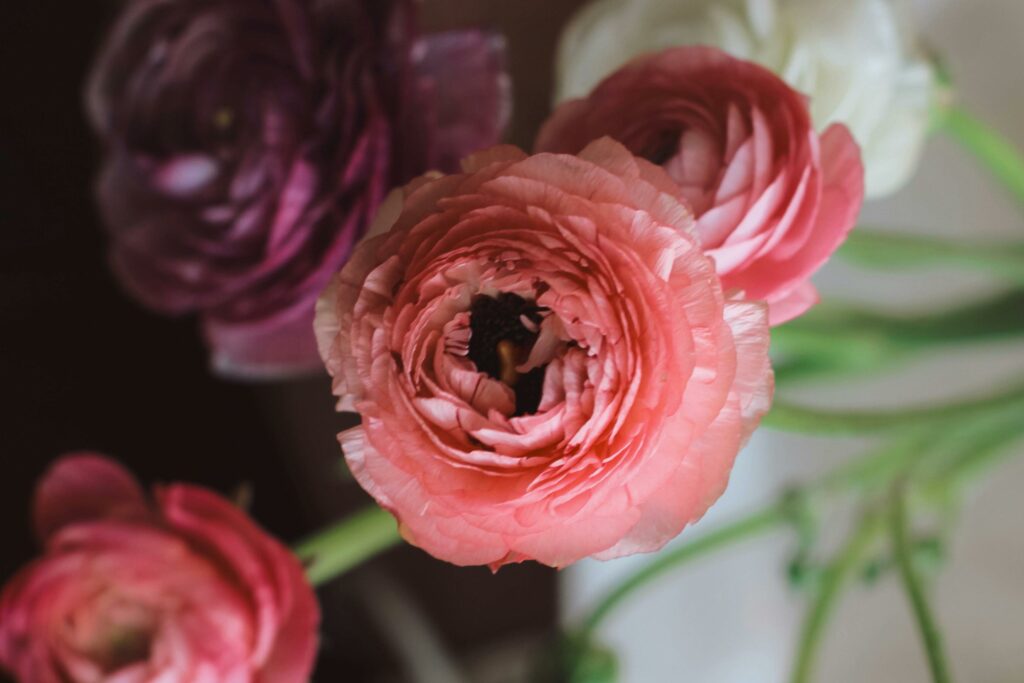Choosing the right flowers to celebrate someone’s success is an art that varies beautifully across Asian cultures. Understanding these traditions ensures your gesture conveys genuine joy and respect.
China
Best Choices:
- Peonies are the ultimate congratulatory flower, symbolizing prosperity, honor, and good fortune. They’re perfect for business openings, promotions, or academic achievements.
- Orchids represent refinement, elegance, and scholarly achievement, making them ideal for graduations or professional milestones.
- Chrysanthemums (in bright colors like red, pink, or yellow) symbolize longevity and joy. Avoid white chrysanthemums, which are reserved for funerals.
- Bamboo plants convey strength and resilience, excellent for new business ventures.
Color Guidance: Red and gold are especially auspicious. Avoid white flowers or arrangements with four stems (the number four sounds like “death” in Chinese).
Japan
Best Choices:
- Cherry blossoms symbolize renewal and the beauty of life, though they’re seasonal.
- Orchids are highly respected and appropriate for formal congratulations.
- Red or pink roses express celebration and admiration.
- Sunflowers convey cheerfulness and are suitable for personal achievements.
Important Notes: Avoid giving potted plants to someone in the hospital (suggests prolonged illness). The number of stems matters—odd numbers are preferable. Never give four or nine stems (associated with death and suffering).
Korea
Best Choices:
- Roses (particularly yellow or pink) express friendship and celebration.
- Sunflowers symbolize adoration and loyalty.
- Lilies represent purity and prosperity.
- Money trees or flowering plants in decorative pots are popular for business openings.
Cultural Considerations: Bright, cheerful colors are preferred. Grand floral stands are common for business openings and major celebrations. Avoid white or yellow chrysanthemums (funeral flowers).
India
Best Choices:
- Marigolds are sacred flowers that represent auspiciousness and positive energy, perfect for any celebration.
- Roses (especially red, pink, or yellow) are universally appreciated.
- Lotus flowers symbolize purity, enlightenment, and new beginnings.
- Jasmine represents purity and good fortune.
- Tuberoses are fragrant flowers used in celebrations.
Cultural Context: Garlands (flower necklaces) are traditional for honoring achievements. Bright, vibrant colors are celebrated. Orange and yellow flowers align with Hindu traditions.
Thailand
Best Choices:
- Orchids are Thailand’s national flower and symbolize beauty, refinement, and luxury.
- Jasmine represents purity and is deeply meaningful in Thai culture.
- Marigolds bring good fortune and joy.
- Roses in bright colors express celebration.
Presentation: Consider traditional flower garlands for special honors. Bright, fragrant arrangements are highly valued.
Vietnam
Best Choices:
- Orchids symbolize elegance and prosperity.
- Lilies represent purity and good fortune.
- Sunflowers convey happiness and success.
- Roses in cheerful colors are always appropriate.
Considerations: Avoid white flowers (associated with mourning) and odd numbers of stems. Even numbers are preferred for happy occasions.
Singapore (Multicultural)
Given Singapore’s diverse population, it’s wise to consider the recipient’s cultural background. Generally safe choices include:
- Orchids (Singapore’s national flower)
- Roses in warm colors
- Sunflowers
- Lilies in colors other than white
Universal Guidelines Across Asian Cultures
Do:
- Choose vibrant, cheerful colors
- Include a thoughtful card with your congratulations
- Consider the recipient’s specific cultural background
- Present flowers in even numbers (except in Japan)
- Opt for fresh, high-quality blooms
Avoid:
- White flowers (associated with funerals in most Asian cultures)
- The number four in Chinese and Japanese contexts
- Overly wilted or dried arrangements
- Strongly scented flowers if you’re unsure of preferences
Modern Considerations: Younger, more cosmopolitan Asians may be less strict about traditional associations, but when in doubt, choosing culturally appropriate flowers shows thoughtfulness and respect. If you’re uncertain, consulting a local florist familiar with Asian traditions can be invaluable—they often understand both the symbolism and contemporary preferences.
The gesture of sending flowers to congratulate someone transcends cultures, but choosing blooms that align with their traditions makes your celebration even more meaningful.

